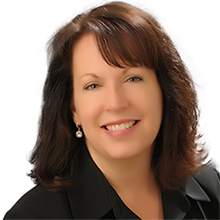Higher Cred
Courts are mirrors that reflect the pressing issues society is facing – from the struggles of today’s juveniles and families to the escalation in human trafficking and people addicted to opioids. The need for court employees well-versed in efficient, modern court operations, and able to adapt to ever-changing obligations, is critical for a responsive judicial system that can ensure justice.
It’s challenging for busy court officials and employees to keep up with these and other multi-faceted demands. Courts grapple with personnel issues, case flow management, technology limitations and upgrades, security concerns, financial operations, evolving societal trends, and more. Since 2002, Ohio court employees have had the opportunity to advance their knowledge with court-specific education without leaving the state. Ohio is one of only six states that provides this kind of education. The Ohio Supreme Court, through its Judicial College, partners with the Institute for Court Management (ICM) at the National Center for State Courts (NCSC) to provide intensive training that leads to national-level certifications as a certified court manager (CCM) or a certified court executive (CCE).
Just this year, 35 court employees in Ohio to date have earned the manager certification and 40 employees have achieved the executive designation. Education for CCM certification gives a comprehensive understanding of courts with a focus on day-to-day processes. Courses in the CCE program center on enhancing leadership skills to help courts better serve their communities.
Although each certification takes three years to complete, the time commitment is relatively modest and structured to be manageable. Participants attend two-and-a-half days of training twice each year. Court employees first complete CCM training, then they can decide whether to work toward the CCE credential.
For those with even more ambition, NCSC offers a fellows certification. Students explore a topic in depth, write a formal research paper, and present their results in Washington, D.C. Thirty-four court employees in the state have attained this credential.
Connections + Know-How
Ohio uses a model in which the 40 to 45 students accepted into a certification program move together through the three years of courses, said Dot Keil, education program manager at the Ohio Judicial College. Students build close professional relationships with other court staff on whom they can rely for advice and insight when they return to their courts.
The courses also are designed to provide practical skills, Keil noted.
“Students can apply what they learn right away,” she said. “It’s a commitment, but the benefits are great.”
But what do participants say? We talked with three graduates and one current student to learn firsthand what the courses are really like and how the program benefited them and their courts.
Q What made you initially decide to enroll in a certification program?
Brown: My court administrator at the time, Michael Flanagan, who was also my mentor, encouraged me to take advantage of the new Court Management Program being offered beginning in 2002. I was naturally interested, thinking that it would help me in my work of court administration.
McNachtan: I learned about and was encouraged to enroll in the program by two co-workers while employed at the Ohio Supreme Court. I enrolled based on their feedback and encouragement. I was skeptical, but I have to admit I learned valuable information about court culture, processes, and best practices in the classes that have helped me in my roles while employed by both courts.
Stephenson: I’m a lifelong learner. I can never know enough. The program was a growth experience and good for my brain! I also was interested in the additional support I would gain from networking with professionals who are in my line of work from across the state and nation.
Wickett: First, I always want to enhance the knowledge and skills that I bring to Hamilton County Juvenile Court, so my team and I can provide the best human resources services possible. The more I understand court operations and functions, the better we can serve our court. The CMP is truly helping me better understand the various court functions, and I’m grateful for the opportunity to participate.
Second, I wanted to meet court personnel from around the state, so we could share ideas and information. We face many of the same challenges and are pursuing many of the same goals within our courts. There is a wealth of knowledge and experience in the room every time we meet for classes, and I love talking with and learning from my peers.
Q What was the most difficult part of the program?
Stephenson: The program requires participants to attend courses for two to three days, twice a year, and the courses are held outside my hometown. The hardest part of the program was stepping away from my regular job and leaving my family – I have four kids – to attend the program.
McNachtan: The hardest part for me was leaving the office for two-and-a-half days. I found myself answering work calls and emails on breaks and after class to deal with issues back at both courts.
Brown: I must say that doing the program and getting the certification was not difficult at all. You do have to travel to complete it, but the face-to-face classes and the comradery with colleagues developed over the classes are invaluable.
Nonetheless, as an introvert, the hardest part of doing the program and getting the certification for me was the numerous class exercises and presentations that were required. But those requirements made the experience more real and personal for the participants.
Q How was the program beneficial to you?
Stephenson: It’s a scholarly program with instructors who bring high-level, often national, expertise, and the information provided is current. The length and depth found in this program isn’t offered elsewhere in Ohio.
But what I valued most of all was making connections with other staff working in different courts. As part of the coursework, we participated in various exercises and activities, and were often grouped with people who work in similar types of courts. That was beneficial in both the class discussions and back at my court. For example, when a new law was passed in Ohio regarding expungement of civil protection orders in some circumstances, I had an automatic group of former classmates to turn to who I knew and trusted to discuss the practical implementation of and concerns about the new law.
Brown: My first class was “Court Performance Standards,” which detailed the very important principles of justice: access; expedition and timeliness; equality, fairness, and integrity; independence and accountability; and public trust and confidence. These pillars of our justice system, which sometimes get lost in our hectic schedules, reinforced for me the best orientation, foundation, and motivation for how to carry out my day-to-day management responsibilities in court administration.
What I enjoyed most about the courses were the course content, getting to know my classmates, and getting to know my skilled trainers.
McNachtan: The most important benefit, in my opinion, is the networking and development of relationships with other court leaders throughout the state. For example, I have developed excellent relationships with several court administrators and clerks, and I was able to obtain copies of other court maintenance contracts for their case management systems to review and compare with Montgomery County’s agreement. I used these documents as a starting point to re-negotiate our court’s contract with a vendor. By using this strategy, Montgomery County saved more than $1 million over a five-year deal.
Q What practical skills did you take back to your court?
McNachtan: The curriculum introduces metrics as a way to improve court administration. One of our goals at the Montgomery County General Division is to use metrics to become a data-driven court. In 2018, we will initiate a project to create dashboards to use data for critical decision-making. For example, we may track the recidivism rates of citizens that use specified drug and alcohol counseling treatments recommended by the court’s probation officers. The court would track various data elements and use this data to see which programs have less recidivism. We would look to see if the program interventions work better for specific demographics (based on sex, race, age, drug of choice, etc.) and use the data to identify possible best practices to decrease and improve our recidivism rates with our clients.
The program also discusses the importance of training for both court and judicial staff as well as clients we work with. At my court, we’ve created a tutoring lab and education program where many people on probation obtain tutoring support. We have recently installed a GED testing center at our Day Reporting Center where people in the community can take a GED test and receive a GED certificate if they pass.
Wickett: The “Purposes and Responsibilities of Courts” class helped immediately with a project that we are working on in the human resources department: developing and implementing a more robust employee orientation program. So many key concepts in that CMP course are helping us emphasize for new employees the importance of their roles within the courts. For example, explaining to new employees the concepts of due process, equal access to justice, and procedural fairness can provide them with a strong foundation to understand how the services that they provide can impact the public’s perception of those important concepts. We are excited to implement the new orientation program, and the CMP class definitely helped us present important concepts in a meaningful way.
Stephenson: Other than on-the-job training, everything I’ve ever learned about case management I learned in the certification programs. Also, in situations locally where new ideas are presented, I can now rely on my expertise to make our process better, like stopping before changes are made to consult stakeholders connected to the justice system for their input about new proposals.
Brown: I brought back a more thorough knowledge of court management disciplines, including human resources, finance, case flow management, technology and information management, and leadership. The courses included active participation in exercises in each of these topics, as well as pre-planning for areas of need in individual courts that could be addressed upon my return to work. My experience through the ICM program was so valuable that I have encouraged my court to support approximately 10 graduates of the program since my completion, and some of them have advanced through the CCE and fellowship programs, too.
Moreover, given the competitive statewide process for the limited number of seats in Ohio’s program each year, this past year my court approved my implementation of a “Cleveland Municipal Court Leadership Program.” I was intrigued by other courts, including Washington, D.C., and Arizona, that had created in-house programs with similar subject matter as the CMP, but with a much less intensive (and non-certified) approach. We kicked off the inaugural class of our program in August 2017, with a class of 20 inspired participants.
Q What did you enjoy about the courses?
Wickett: I like everything about the courses! The instructors are knowledgeable and experienced, the Ohio Supreme Court staff works hard to ensure that we have a great class experience, and learning with our peers is helpful.
One of the main things that I like about the CMP courses is that the courses provide theoretical, big-picture concepts and practical applications of how to apply those concepts in our courts here in Ohio. For every course module, we have an opportunity at the end to reflect on what we’ve learned and to write notes on the practical impact. It helps ensure that we’re seeing the relevance of what we’re learning and are more likely to apply what we’ve learned when we’re back at work.
McNachtan: Hearing other people’s insights and perspectives, developing long-term relationships with other court leaders, learning theory and skills that I used in practice, and having a takeaway “reference manual” I could look back on.
Q What surprised you about the program or your experience?
Stephenson: I didn’t anticipate how valuable the connections I made would be, or how much I would learn from my peers. I expected to learn everything from the instructors, but often the best learning is from the students in the class.
Brown: The major surprise I personally experienced was the important realization that court management in the judicial branch is a growing profession, and that it requires conscientious persons who are both knowledgeable and compassionate about the role of courts and the essential service that we provide.
McNachtan: I was surprised how much I retained and how I used the curriculum and toolkits back at the office.
Q How has the program helped your career?
Stephenson: The certification means you’ve engaged in and completed the in-depth educational process. There’s no sliding through these courses. I am sure that I do a better job for my court because of the knowledge I have gained. I’ve been at my court for more than 20 years, and have no plan to move on, but for those seeking to advance their careers, the designation is helpful when trying to move to a different court.
McNachtan: I feel that the program and my 13 years combined at the Supreme Court and in Montgomery County has changed how I look at everything while working with courts. I see things through a judicial administration “lens” now. I also have noticed job postings from other courts that use the certifications as a way to screen applicants.
Brown: I’m now a trainer for the Ohio Judicial College/ICM Leadership Course, and I’ve participated in numerous court forums and workshops, including the prestigious “Executive Session for State Court Leaders in the 21st Century” meeting at the Harvard Kennedy School of Government between 2008 and 2011. In 2015, I was part of an NCSC team invited to review the Ferguson, Mo., court as a result of U.S. Department of Justice findings associated with the unrest after the fatal shooting of Michael Brown. Earlier this year, I was elected to the NCSC Board of Directors, which is a grand opportunity to help state courts and international court systems to continuously improve the administration of justice.
Q How did your court support you?
Wickett: Hamilton County Juvenile Court has a long tradition of being tremendously supportive of court managers participating in the program. Court leaders were not only supportive of my application to the program, they also approved of and have allowed time for me to become certified as faculty and to instruct CMP classes. When I’m attending CMP classes, my colleagues are respectful that I’m focusing on the classes. As issues arise on those days, court leaders work with my co-workers in human resources, or they wait until after class to discuss issues with me. When I return from attending CMP classes, my colleagues ask about what I’ve learned, and we talk about how what I’ve learned applies to situations in our court.
McNachtan: My direct supervisor at the Supreme Court encouraged me to learn more about court management so that the IT division could improve customer service with the Supreme Court as well as courts throughout the state. The Supreme Court paid for the tuition and allowed time off to attend the events. The Montgomery County Common Pleas Court also paid and provided an opportunity for me to participate in the courses. Both courts found value in the program and thought it would make me a better administrator.
Q What advice would you give to someone thinking about certification?
Brown: Just go for it! It will be educational, enjoyable, and you’ll meet some of our fantastic colleagues from different jurisdictions across the state. Your CMP experience will strengthen your own professional development as well as your service to your judges, staff, and the public. Moreover, your CMP experience will help provide better justice in our courts and in the lives of our neighbors, and further the stability of our local and broader communities.
McNachtan: The program is worth the time and money because you network and develop relationships with other court leaders and you learn new concepts, best practices, and practical ways to do your work. I turn to the curriculum and books as reference guides, and the curriculum provides toolkits to implement best practices.
Wickett: Jump in wholeheartedly! The Court Management Program provides a great opportunity to learn court-specific skills and to network with peers who work in courts throughout the state. Strive to meet as many colleagues as you can, and enjoy the opportunity to develop your skills. Don’t be shy about sharing your expertise and experience with others. It’s helpful.
Stephenson: If you’re debating whether to enroll, go for it. And give it your all. Go, engage, and make connections.






